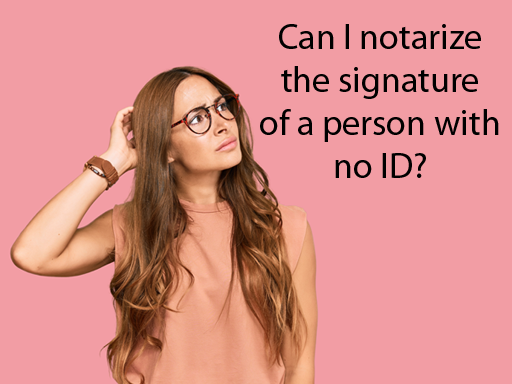The legal requirements for identifying a person appearing for a notarial act vary by state, so the answer is determined....
 The legal requirements for identifying a person appearing for a notarial act vary by state, so the answer is determined by law of the state where you are commissioned. (Additional references to state law mean laws and/or administrative rules.)
The legal requirements for identifying a person appearing for a notarial act vary by state, so the answer is determined by law of the state where you are commissioned. (Additional references to state law mean laws and/or administrative rules.)
Almost everywhere in the United States, a notary may rely solely on personal knowledge to identify a person appearing for a notarial act. “Personal knowledge” means the notary has reasonable certainty that the person is who he or she/they claim to be, based on the notary’s regular dealings with this person over time.
In just a few states, personal knowledge alone is not enough… the person must also be able to present a form of identification that is acceptable under the notary’s state law.
Notaries everywhere may identify a person by means of an identification credential or document that is acceptable under the notary’s state law.
Sometimes the person appearing before a notary isn’t personally known and lacks an acceptable ID document. Many states allow their Notaries to identify such persons through the sworn statement of another individual—often called a “credible witness”—who personally knows the person appearing for the notarial act. The credible witness must meet requirements of the notary’s state law to act in this capacity. Generally, the credible witness must be fully impartial with respect to the transaction, and must be identified by the notary as specified by the notary’s state law (except that a credible witness cannot be identified by another credible witness).
To complete identification of a person by use of a credible witness, the notary first identifies the credible witness; then obtains the credible witness’ sworn statement that he or she/they personally know the person requiring the notarial act (a verbal-only oath, or a written affidavit that itself requires notarization, depending on the state where the notarization is occurring); then completes the notarial act for the now-properly identified person whose signature requires notarization. The credible witness’ sworn oath or affidavit must be worded as specified in the presiding notary’s state law, if applicable.
If the notary keeps a record book of notarial acts (journal), an entry for the credible witness’ sworn statement or affidavit should be created in addition to the entry for the signature notarization performed for the person identified by the credible witness. The notary should cross-reference each of these related entries (for example, “Entries 10 and 11 are related.”)
A final point: Multiple states that have enacted remote online notarization by means of communication technology also authorize use of a credible witness to identify a remotely located individual who cannot be identified by other specified means. The same general principles for use of a credible witness to ID a physically present person also apply when the person appears remotely by means of communication technology.
